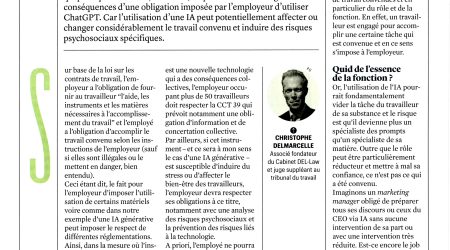Can an employer legally "phase" planned layoffs to avoid the information and consultation procedure required in the case of collective redundancies, known as the "Renault Law"?
Posted the 18 May 2021Specifically, six workers were dismissed without any prior consultation, while other layoffs had already occurred in the fall.
A national collective agreement (CBA) No. 24 defines collective redundancy as "any dismissal for one or more reasons unrelated to the employee's person, affecting a certain number of employees within a period of sixty days." This means:
- For companies with 20 to 100 employees, at least 10 workers,
- For companies with 100 to 300 employees, 10% of workers, and
- For companies with more than 300 employees, more than 30 workers.
This definition implies that if an employer plans to dismiss more than 10, 10%, or 30 workers, but over a period exceeding 60 days, it does not constitute a collective redundancy under CBA 24, and the Renault Law does not apply. For instance, if an employer announces plans to dismiss five employees in April, six in July, and seven in October 2021 (i.e., more than 10 in total), it makes no difference. Workers and unions understandably find this frustrating. However, the Renault Law applies only if there is a collective dismissal decision—not merely a plan.
For Fabricom, six employees were dismissed in February 2021, which is below the threshold. The employees dismissed in October 2020 were excluded from consideration, as their dismissal occurred more than 60 days earlier. Therefore, Fabricom was not obligated to comply with the Renault Law.
Even if the Renault procedure does not apply, a collective redundancy compensation may still be required, as the threshold under CBA No. 10 is lower, with a minimum of six dismissed employees within a 60-day period. However, this compensation only applies to employees with a notice period of less than seven months, and the amount is relatively modest.
More importantly, beyond the "federal" legal provisions on collective redundancies, some joint committees have CBAs that require specific procedures in the case of "multiple dismissals," particularly concerning information or exhausting all options to reduce redundancies beforehand. Careful attention must be paid when drafting such CBAs, as they sometimes apply not only to dismissals but also to broader "intentions" to dismiss more than a certain number of workers. In such cases, "phasing" layoffs may be ineffective. Additionally, these CBAs often include significant financial penalties.
Finally, while phased layoffs are legal, they create considerable uncertainty for employees, with all the consequences this entails for productivity and workplace relations. A "well-executed" Renault procedure, however, can be completed relatively quickly, allowing those who must be dismissed to leave under the "best" conditions while uniting those who remain around a new project for the company.
Related articles

Is an employer allowed to mandate the use of artificial intelligence tools by employees ? (Trends, 17-07-2025)

Caution if a former colleague opposed to your employer asks you to testify in their favor
